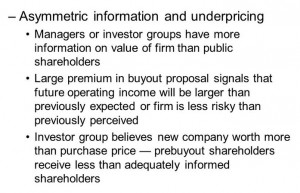In financial market what is meant by asymmetric information?
When a manager knows more about his or her firm’s future than do the analysts and investors who follow the company then a situation of asymmetric information exists. In this situation, a firm’s managers may correctly conclude that its securities are undervalued or overvalued depending on whether the inside information is favorable or unfavorable. Of course, there are degrees of asymmetry management is almost always better informed about a firm’s prospects than are outsiders but in some situations, this informational difference is too small to influence managerial actions. In other circumstances such as prior to a merger announcement or when a drug company has made a major research breakthrough managers may have information that will significantly alter the prices of the firm’s securities when it becomes public. In most situations, the degree of information asymmetry lies between the two extremes.
The potential impact of asymmetric information on markets was analyzed by George Akerlof in a paper titled “The market for Lemons”
The only convincing way for a seller to convey to potential buyers that the product is good to take some action that buyer can unambiguously interpret as a sign that the product is not defective. Such actions are called signals and the act of providing signals is called signaling.
Since manager’s primary goal is to maximize shareholders wealth managers are generally motivated to convey favorable inside information to the public as rapidly as possible. The easiest way would be to issue a press release announcing the favorable development. However, an outsider would have no way of knowing whether the announcement was true or how important it really was. Therefore such announcements have limited value. But if managers could signal information concerning favorable prospects in some truly credible way then the information would be taken seriously by investors and reflected in security prices.
Example: Dividend announcements are the classic example of managers providing information through signaling. If a firm announces a significant increase in cash dividend this is its managers signal that the firm has good future earnings and cash flow prospects. If dividend increase is widely anticipated but then is not forthcoming this is a negative signal.
The presence of effective management signals plays an important role in financial management.
Written by
Md. Nahian Mahmud Shaikat



